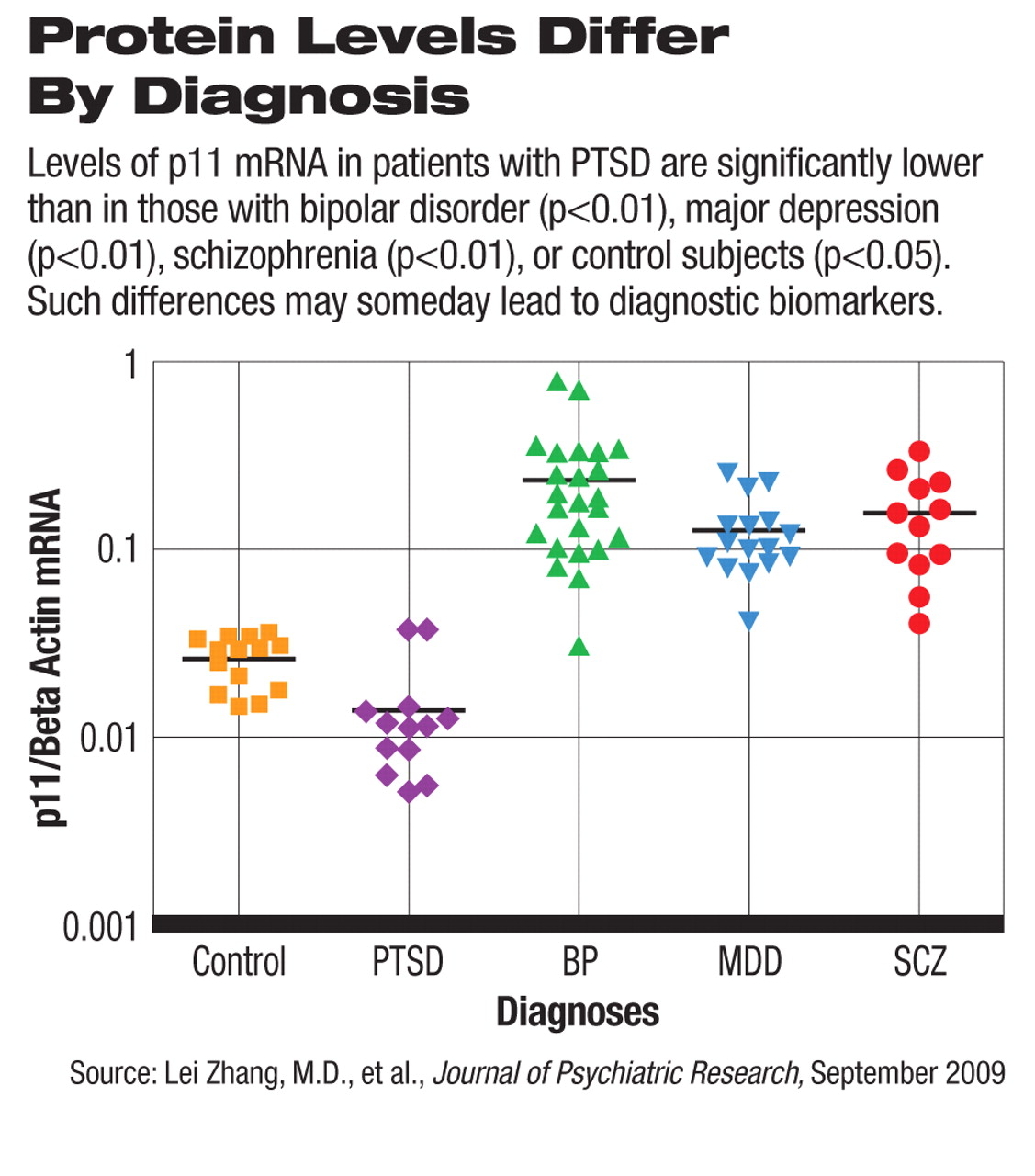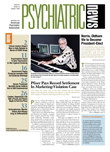One of the realities of practicing psychiatry is the reliance on patients' subjective descriptions of their symptoms. How many psychiatrists have wished for the equivalent of the internist's minimally invasive blood or urine tests that reveal so much about the patient's heart, kidneys, lungs, or liver? An objective biochemical test that could provide a quantifiable measure to diagnose psychiatric illness and measure its response to treatment would be welcomed by researchers, clinicians, and patients alike.
Interest is especially high now in potential biomarkers for mild traumatic brain injury and posttraumatic stress disorder (PTSD) as a consequence of the wars in Iraq and Afghanistan. Such tests do not yet exist, but research teams have hypothesized that substances such as cortisol, GABA, or platelet serotonin might be markers for PTSD.
A team of researchers led by Lei Zhang, M.D., an assistant professor of psychiatry at the Uniformed Services University of the Health Sciences (USUHS) in Bethesda, Md., have proposed another candidate for such a biomarker for PTSD, a protein called p11. They reported their findings in the September Journal of Psychiatric Research.
Animal research has shown that stress and the stress-related hormone glucocorticoid increased expression of p11. Previous human research showed that p11 was down regulated in the cortex of patients with depression but that p11 mRNA was up regulated in the prefrontal cortex of those with PTSD, raising the possibility that the two conditions might be differentiated by p11 levels.
“The glucocorticoid receptor turns the p11 promoter on and off, allowing us to see how stress links to the molecular mechanism and thus to the disease,” said Zhang in an interview. “The p11 peptide also interacts with serotonin 5HTI-B, which plays a role in depression.”
Their next step was to seek any correlations between levels of p11 in the blood and PTSD, given the intricacies of the blood-brain barrier, said Robert Ursano, M.D., a professor of psychiatry at USUHS and a coauthor of Zhang's paper.
“The challenge of biomarkers in psychiatry is always blood versus brain,” said Ursano.
In their current study, Zhang, Ursano, and coworkers examined 79 subjects: 13 diagnosed with PTSD, 16 with major depressive disorder, 24 with bipolar disorder, 12 with schizophrenia, and 14 nonpsychiatric controls. They were recruited though National Yang-Ming University and the Taipei Veterans General Hospital, both in Taipei, Taiwan, where several of Zhang's coauthors work.
The subjects were categorized by an examination of their records and through clinical interviews. About 77 percent of those with PTSD also had other psychiatric comorbidities. They gave samples of blood and salivary and serum cortisol.
The researchers found that patients with PTSD could be separated from the others in the trial according to blood levels of p11.
Patients with PTSD had lower levels of p11 mRNA in their peripheral mononuclear blood cells than controls. Patients with bipolar disorder, major depression, or schizophrenia registered significantly higher levels than in controls or PTSD patients (see chart).
Clinically, p11 mRNA expression in patients with PTSD also correlated positively with scores on the Hamilton Rating Scale for Depression and on measures of trauma severity and frequency, although not with the Hamilton Rating Scale for Anxiety or the Impact of Event Scale–Revised. However, p11 mRNA levels did not correlate with depression or anxiety scores among patients with bipolar disorder, depression, or schizophrenia.
“[T]his study provides preliminary findings that [peripheral blood mononuclear cell] p11 mRNA expression levels could be used as a potential biomarker for differentiating PTSD from other major psychiatric disorders,” wrote Zhang and colleagues.
The study did not report the effects of any medications on p11 or glucocorticoid receptor expression, and there were too few men in the PTSD cohort to compare gender effects reliably.
However, Zhang will have the chance to make up the latter shortcoming and replicate his findings using a much larger sample shortly. He and his colleagues will travel to Fort Bragg, N.C., to collect blood samples and several psychometric measures from 1,200 U.S. troops returning from war for a double-blind study of p11 and glucocorticoid expression levels. He is also participating in the U.S. Army/NIMH study of suicide risk and protective factors that began this summer (Psychiatric News, August 21.)
Although much more work on p11 remains to be done before it can be considered a true biomarker for PTSD, Zhang believes that eventually its full mechanism will be understood, leading to quick, in-office tests. Continuing measurements might then also help monitor treatment.
An abstract of “Levels of the Potential Biomarker p11 in Peripheral Blood Cells Distinguish Patients With PTSD From Those With Other Major Psychiatric Disorders” can be accessed at<www.sciencedirect.com/science/journal/00223956> by clicking on Volume 43, Issue 13, and then “Preview” under the study title. ▪

